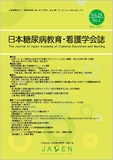Japanese
English
- 販売していません
- Abstract 文献概要
- 参考文献 Reference
目的:就労している2型糖尿病患者の生活時間のマネジメントとQOLの関連を明らかにし,生活時間のマネジメントを活用した患者教育方法について検討する.方法:就労している2型糖尿病患者に質問紙調査を実施した.調査内容は,基本属性,生活時間のマネジメント,健康関連QOLとした.分析は,健康関連QOLを従属変数,生活時間のマネジメントを独立変数とした重回帰分析,決定木分析を実施した.結果:187名を分析対象とし,重回帰分析では,生活時間のマネジメントと精神的側面,役割/社会的側面との関連がみられた.決定木分析では,精神的側面と最も関連があるものは“時間のコントロール”であり,役割/社会的側面では“仕事の調整”であった.結論:生活時間のマネジメントという側面からケアをする際は,“時間のコントロール”に着目しながらも,患者の主体的な意思決定を重視しながら生活時間のマネジメントができるように関わることが望ましい.
Objective: This study aimed to clarify the relationship between daily time management and quality of life (QOL) in employed patients with type 2 diabetes and consider methods for patient education utilizing daily time management. Method: A questionnaire survey was administered to employed patients with type 2 diabetes. The survey consisted of basic attributes, daily time management, and health-related QOL. Regarding statistical analyses, multiple regression and decision tree analysis were performed with health-related QOL as the dependent variable and daily time management as the independent variable. Results: The analysis set consisted of 187 subjects. Multiple regression analysis found relationships between daily time management and both mental and role/social aspects of health-related QOL. Decision tree analysis showed that the item most closely related to mental aspects was “time control” while the item most closely related to role/social aspects was “adjustment of work.” Conclusion: When providing care to patients from the perspective of daily time management, it is beneficial to help patients learn how to manage their time while focusing on “time control” and emphasizing independent decision making by the patient.
Copyright © 2021, Japan Academy of Diabetes Education and Nursing. All rights reserved.


